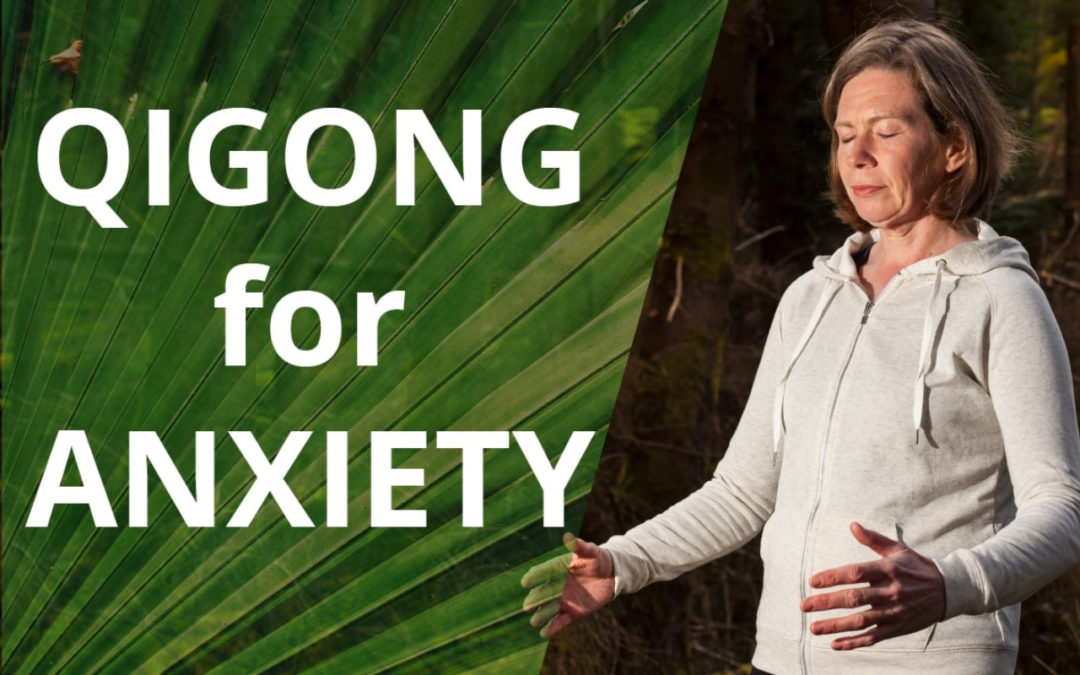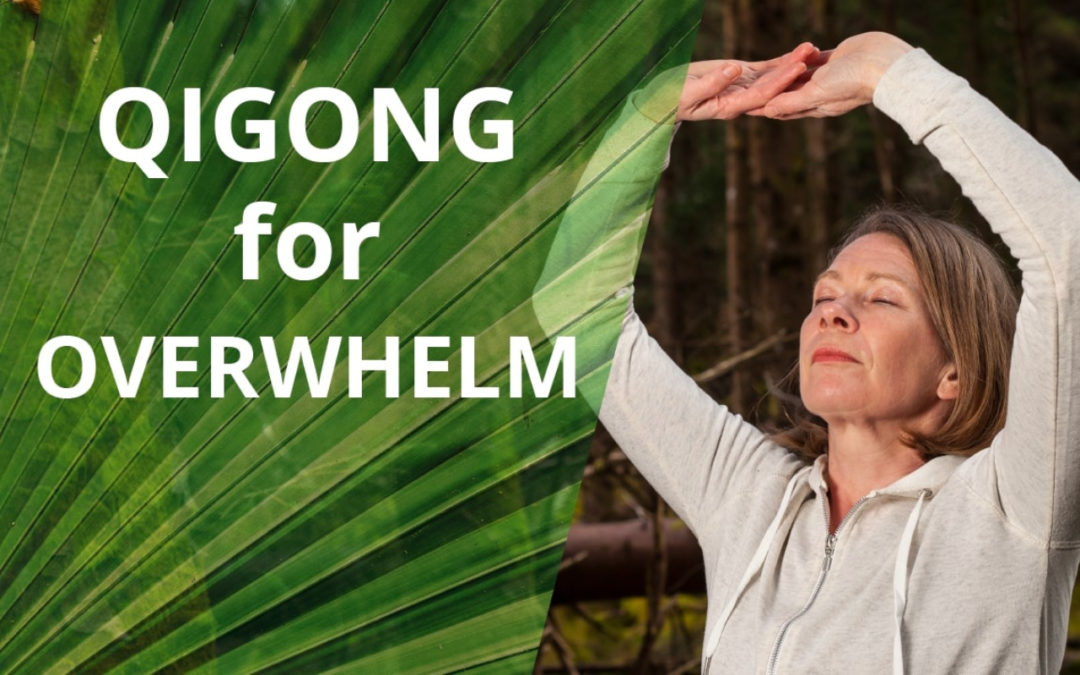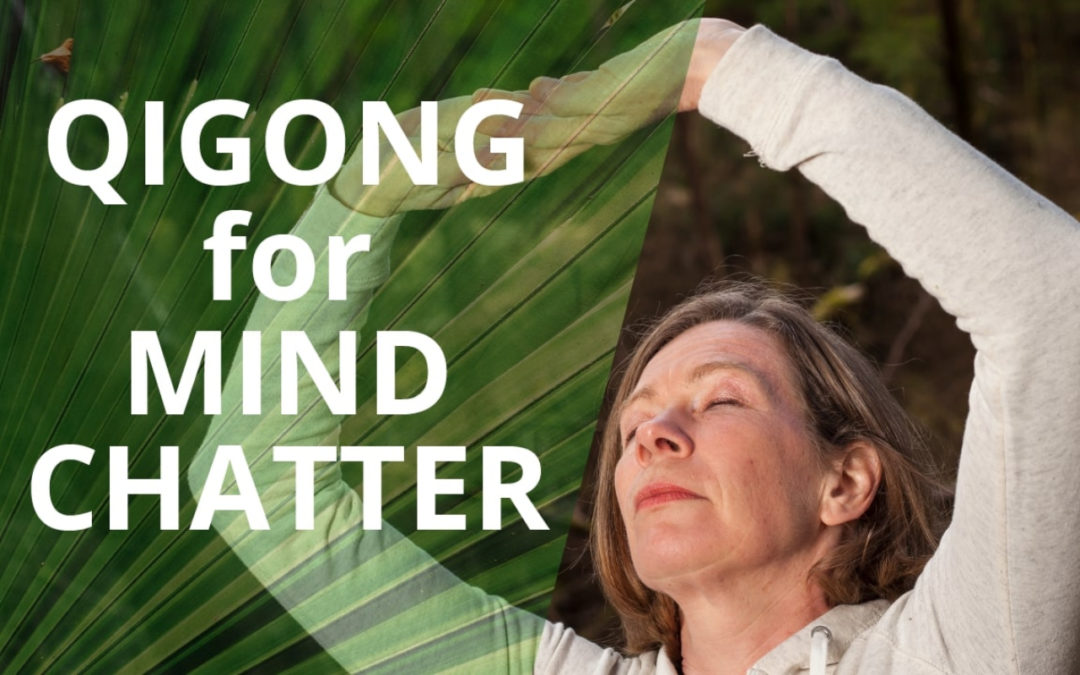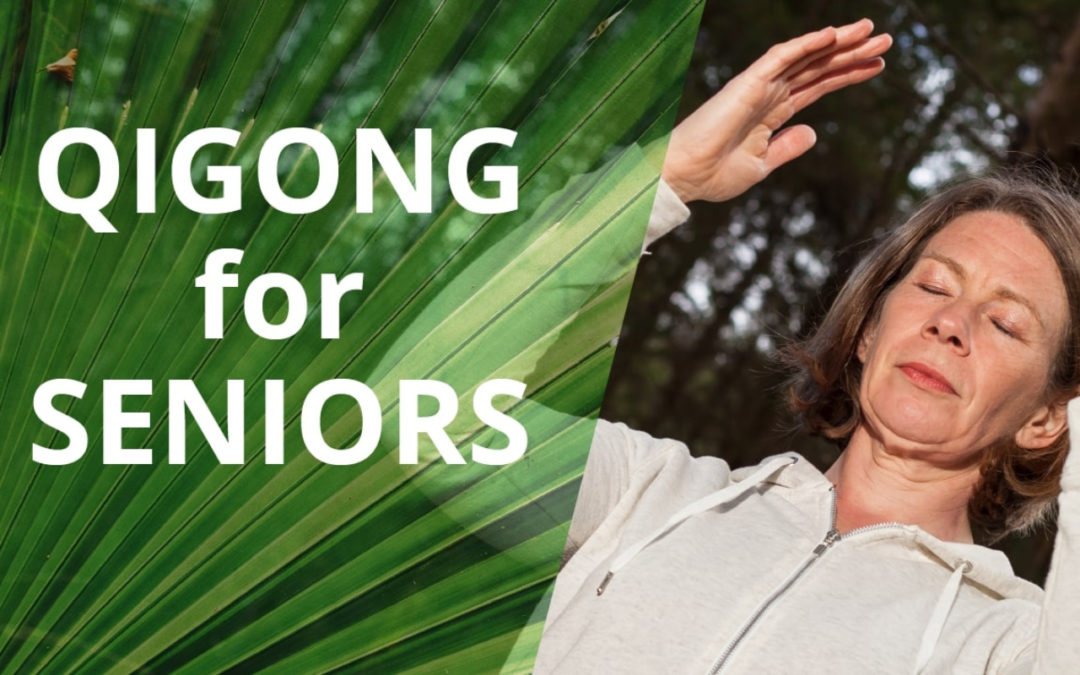
by janicetucker | 24 Aug 2017 | Qigong, Qigong & Emotional Issues, Qigong Routines, Qigong To Help Manage Specific Health Conditions
When we feel anxious that is a sign that we are concerned about something in the future. If it’s a past negative event we are thinking of then the feeling is often one of resentment. In this post I’m going to give you some tips as to how to use Qigong for anxiety reduction. Below you will find my 3 top tips to use Qigong for anxiety.
Janice Tucker is a practitioner of Traditional Chinese Medicine and Medical Qigong, and the founder of the Space To Relax online programme of Qigong video lessons.
Please don’t forget to subscribe to my YouTube channel by clicking the red “Subscribe” button above so you don’t miss my regular videos which are full of useful health enhancing tips. These videos will help you to benefit your health and prevent illness from arising in the first place. Also please give this video a “Like” if you found it informative.
What Is Anxiety?
When we feel anxious we may feel the following sensations:
- Butterflies in the stomach or heart area
- Palpitations or racing heartbeat
- Clammy palms
- Shortness of breath
- Fear
- Withdrawn
- Can’t face people in social situations
Our anxiety will often keep us awake at night and rob us of peace of mind. It may cause us to think negatively about situations. If you experience any of these feelings then the video here will help you to get started on the path to annihilating anxiety.
3 Methods Using Qigong For Anxiety Reduction
1. The “One Breath” Method
Use this method of taking one abdominal breath into the belly and then breathing out. Consciously do this and you will find it very quickly calms your mind and leaves you feeling grounded.
2. Relax, Expand and Nourish The Heart Method
This simple, relaxing Qigong method is available as a free audio meditation on the Space To Relax homepage. Scroll to the bottom of the page to sign up for the audio called “Calm Your Busy Mind in 8 Minutes” and it will be delivered to you by e-mail. This extremely useful method will help you to reduce anxiety. It also promotes peaceful sleep by eliminating stagnant Qi (energy) flow on both a physical and emotional level.
3. Abdominal Breathing
This method is the basis of many Qigong methods. It is available as Lesson 1 in my free 3 part Qigong video lesson series (see below for details). Also you can learn Abdominal Breathing from one of my previous video blogs here. (https://spacetorelax.com/how-to-do-qigong-abdominal-breathing-or-diaphragmatic-breathing/).
What Do I Do Next?
To learn even more Qigong for anxiety reduction go to the Space To Relax homepage. There you can sign up to receive three free video lessons which will be delivered to you by e-mail over the course of a few days. Also, for the free audio meditation “Calm Your Busy Mind In 8 Minutes” scroll to the bottom of the Space To Relax homepage.
Please don’t forget to subscribe to my YouTube channel by clicking the red “Subscribe” button. Then you won’t miss my regular videos which are full of useful health enhancing tips. Also please give this video a “Like” if you learned more about Qigong for anxiety minimisation.
If you are on Facebook head over to my free group, “Space To Relax Free Group” and leave any comments or questions for me there. I’ll be happy to answer them. Also, by joining this group, you will receive regular posts of Qigong articles and videos with really useful tips about how to use Qigong to improve your state of health.
home

by janicetucker | 11 Aug 2017 | Qigong, Qigong & Emotional Issues, Qigong Routines
Overwhelm is something we all struggle with on one level or another. Our modern lives are so much busier than that of previous generations. We seem to have to juggle more and more things, keeping the plates spinning. If this is your constant challenge then this video will show you how to use Qigong for overwhelm and how to minimise this stress inducing state.
Janice Tucker is a practitioner of Traditional Chinese Medicine and Medical Qigong, and the founder of the Space To Relax online programme of Qigong video lessons.
Please don’t forget to subscribe to my YouTube channel by clicking the red “Subscribe” button so you don’t miss my regular videos which are full of useful health enhancing tips. These videos will help you to benefit your health and prevent illness from arising in the first place. Also please give this video a “Like” if you found it informative.
What Is Overwhelm?
Overwhelm is a FEAR of not being able to get everything done. The result is that you feel stressed, paralysed and like you have no time. You may feel stuck, not sure which thing to tackle next. A lack of direction or feeling you’re not moving forwards is common. You may feel you are not achieving everything you want to achieve. There are many other ripple effects resulting from overwhelm. Suffice to say, it’s not the best feeling!
3 Methods To Tackle Overwhelm
1. Get Present
Overwhelm often creates anxiety because of the fear of not being able to get future tasks done. Bring yourself into the present as much as possible. Do this by using Qigong for overwhelm, or a daily meditation practice. A regular routine will make a huge difference to how you feel about overwhelm.
Doing activities requiring absolute focus in the present moment are also excellent for tackling overwhelm. I go surfing which keeps me in the present as otherwise I’m in danger of falling off my board at a critical moment! Other physical activities such as mountain biking or anything that requires focus in the present moment help to diminish feelings of overwhelm. For those of you less physically active, creative activities such as painting, drawing, pottery enable you to be in the present more often. Adopt more activities like these and make them a habit. Then your feelings of overwhelm will diminish.
2. Start saying “No”
Develop the practice of not committing to people immediately. You don’t have to say yes to everything! Instead tell people that you will get back to them when you’ve had chance to check your plans or that you will check your diary and let them know. This will help you to avoid taking on too much. Also be sure to delegate as much as possible at work and at home. This will take the pressure of overwhelm off you. We are all responsible for creating our own reality. We have a choice as to whether to take on too much. If you want to tackle overwhelm something will have to change and that starts with making different choices.
3. List 3 Things To Achieve The Next Day
Do this the night before. Don’t give yourself too much to do. A huge list can be daunting when you are feeling overwhelmed. We can often feel paralysed, stuck and as though we are not moving forward. Over time this leads to a lack of confidence that we’ll ever be able to progress. You may feel like life is passing you by and you are missing out. Setting yourself the goal of only 3 things to do the next day breaks through the stagnation. It gives you a sense of progress and achievement. This leads to increased confidence that you can tackle overwhelm and you will start to feel better.
What Do I Do Next?
For more information on how to use Qigong for overwhelm head over to a previous video on my website called “Qigong for Motivation“. Here I share with you how to deal with the paralysis and stagnation that can accompany overwhelm.
To learn even more Qigong for overwhelm mimimisation go to the Space To Relax homepage. There you can sign up to receive three free video lessons which will be delivered to you by e-mail over the course of a few days. Also, for a free audio meditation “Calm Your Busy Mind In 8 Minutes” scroll to the bottom of the Space To Relax homepage.
Please don’t forget to subscribe to my YouTube channel by clicking the red “Subscribe” button. Then you won’t miss my regular videos which are full of useful health enhancing tips. Also please give this video a “Like” if you learned more about Qigong for mind chatter and how to control it.
If you are on Facebook head over to my free group, “Space To Relax Free Group” and leave any comments or questions for me there. I’ll be happy to answer them. Also, by joining this group, you will receive regular posts of Qigong articles and videos with really useful tips about how to use Qigong to improve your state of health.
home

by janicetucker | 28 Jul 2017 | Qigong, Qigong & Emotional Issues, Qigong Routines
If you’re anything like me you’ll go thorough times when you just can’t switch off the endless mind chatter and over thinking. If this sounds like you then you’ll find this video invaluable. Below I share with you my 3 tips on how to use Qigong for mind chatter control!
Janice Tucker is a practitioner of Traditional Chinese Medicine and Medical Qigong. She is also the founder of the Space To Relax online programme of Qigong video lessons.
Please don’t forget to subscribe to my YouTube channel by clicking the red “Subscribe” button above. That way you won’t miss my regular videos which are full of useful health enhancing tips. These videos will help you to benefit your health and prevent illness from arising in the first place. Also please give this video a “Like” if you found it informative.
It can be exhausting when you just can’t seem to turn your brain off. What can often happen is that all of this chaotic brain activity ends up stagnating us. We end up feeling paralysed by the overwhelm in our brains. We might then crucify ourselves, beating ourselves up for procrastinating and not moving forward. Does any of this sound familiar?
3 Methods To Minimise Mind Chatter
1. Breathe into your lower belly. Inhaling into the lower abdomen (Dan Tian) area calms your mind. It also brings the chaotic Qi (energy) in your head down into your belly so that you feel more grounded. This will result in your mind being clearer and more focused. When you are clear and focused in your mind you become more efficient at carrying out everyday activities. This has the knock on effect of saving you time so that you get more done resulting in less stress!
2. Give yourself something else to think about. If you are distracted by busy thoughts and can’t concentrate on your breathing the giving yourself something else to think about can help. As you breathe in say the mantra to yourself, “I’m breathing in”. As you breathe out say to yourself, “Relax”. It is very difficult for the mind chatter to creep in if you are saying these words to yourself. This method is a perfect example of how to use Qigong for mind chatter and its control.
3. Dump the mind chatter. Write down any worries, things to do, emotions or distractions on a piece of paper. Once they are out of your brain and on paper you will notice a huge difference. This is because you are clearing brain space and no longer have to hold busy thoughts in your mind as they are safely on paper.
What Do I Do Next?
For more information on how to use Qigong for mind chatter head over to a previous video on my website called “How to Calm Down With Qigong” where you can learn a even more detail about the breathing methods I describe here.
To learn even more about how you can use Qigong for mind chatter minimisation go to the Space To Relax homepage. There you can sign up to receive three free video lessons which will be delivered to you by e-mail over the course of a few days. Also, for a free audio meditation “Calm Your Busy Mind In 8 Minutes” scroll to the bottom of the Space To Relax homepage.
Please don’t forget to subscribe to my YouTube channel by clicking the red “Subscribe” button. Then you won’t miss my regular videos which are full of useful health enhancing tips. Also please give this video a “Like” if you learned more about Qigong for mind chatter and how to control it.
If you are on Facebook head over to my free group, “Space To Relax Free Group” and leave any comments or questions for me there. I’ll be happy to answer them. Also, by joining this group, you will receive regular posts of Qigong articles and videos with really useful tips about how to use Qigong to improve your state of health.
home

by janicetucker | 14 Jul 2017 | Qigong, Webinars & Interviews
I don’t know about you but if I’m learning something from a teacher I like to know a bit about them. I like to know what makes them tick and how they got started with what they are now teaching. So I thought you might want to know a bit more about Janice Tucker, Qigong teacher.
Janice Tucker is a practitioner of Traditional Chinese Medicine and Medical Qigong. She is also the founder of the Space To Relax online programme of Qigong video lessons.
Please don’t forget to subscribe to my YouTube channel by clicking the red “Subscribe” button. That way you won’t miss my regular videos which are full of useful health enhancing tips. These videos will help you to benefit your health and prevent illness from arising in the first place. Also please give this video a “Like” if you found it informative.
This post was inspired by Angelika Fritz who writes regularly online about Qigong and Tai Chi through her website Qialance. She also recently published a book, “The Taijiquan and Qigong Dictionary“. Angelika kindly asked me to be interviewed for a series of profiles she was presenting on her website about Tai Chi and Qigong women. The link to my interview is here. This interview inspired me to share with you a little more about how I came to Chinese medicine and Qigong.
Also in a recent survey I asked the question, “If we were sitting in a coffee shop together and you could ask me one question, what would it be?” A number of you replied by asking questions such as, “What drew you to your work?”
So below you can learn more about Janice Tucker and why I love doing what I love doing!
About Janice Tucker
The Problem and The Solution
I help two main groups of people:
Firstly, those who are stressed about their health but don’t know how to go about bringing it into balance.
Secondly, those people who actually feel healthy and want to keep it that way.
The main frustration in our busy, “always on the go” lifestyle is that we know we should slow down or manage our health better. Operating at speed creates stress, anxiety and exhaustion. However, we just don’t have the tools which will give us a some badly needed breathing space and still get everything done!
Often we might feel as though we are in vicious circle of stress causing physical pain or emotional turmoil. This in turn causes more stress and worry. It seems like there is no way to break this unhealthy pattern.
There is a huge misconception about learning any stress relieving, health enhancing methods like Qigong. That misconception is that is that you need to put aside a certain amount of time each day to practice. That’s simply not true.
The truth is that if you want to make a real difference to your health you will need to spend a little time learning the methods initially. Then after that you will be able to integrate most of them into your daily routine, e.g. when walking, standing in a queue, driving, in bed at night.
My Background
My academic background is in biology which I loved and still do. However, upon moving to Ireland I was unable to find a job in the biology field or make use of my qualification as a science teacher. After about 9 months of being unemployed I realised that this situation was having an impact on my confidence and self esteem. It was at that time that I realised I was in serious danger of becoming depressed and I had better jolt myself into action!
As a last resort I took professional career advice. From that it became clear that I could combine my love of biology, teaching and a desire to help people to heal themselves by becoming a Chinese medicine and Qigong practitioner.
I was inspired during my training and since then have dedicated myself to helping people make positive strides to improve their health, dispel their fears and give them the tools to use now and in the future so that they can thrive.
You can watch this video again on the “About Me Page” of my Space To Relax website and also read more on that page about Janice Tucker, my background and what motivates me to get up in the morning!
I hope this post gives you a bit more insight into why I love helping you all.
What Do I Do Next?
To get started learning some Qigong methods go to the Space To Relax homepage. You can sign up to receive three free video lessons. They will be delivered to you by e-mail over the course of a few days. Also, for a free audio meditation “Calm Your Busy Mind In 8 Minutes” scroll to the bottom of the Space To Relax homepage.
Please don’t forget to subscribe to my YouTube channel by clicking the red “Subscribe” button. Then you won’t miss my regular videos which are full of useful health enhancing tips. Also please give this video a “Like” if you learned a bit more about Janice Tucker and why I’m inspired to help you all.
If you are on Facebook head over to my free group, “Space To Relax Free Group“. Please leave any comments or questions for me there. I’ll be happy to answer them. Also, by joining this group, you will receive regular posts of Qigong articles and videos. They contain useful tips about how to use Qigong to improve your state of health.
home

by janicetucker | 3 Jul 2017 | Qigong, Qigong Practice Guidelines & General Information, Qigong Routines
Today I’m going to be discussing Qigong for seniors and how it can be used for regulating stress as we get older.
Janice Tucker is a practitioner of Traditional Chinese Medicine and Medical Qigong, and the founder of the Space To Relax online programme of Qigong video lessons.
Please don’t forget to subscribe to my YouTube channel by clicking the red “Subscribe” button. That way you won’t miss my regular videos which are full of useful health enhancing tips. These videos will help you to benefit your health and prevent illness from arising in the first place. Also please give this video a “Like” if you found it informative.
A couple of months ago I received and e-mail from Sally Perkins who is a content manager for a senior advice site called Senior Advisor. She had watched a previous video on my Space To Relax website called “Qigong for Stress Relief” and was interested in how Qigong could help the elderly. She very helpfully suggested that I cover the use of Qigong for seniors and how it can help them with stress relief.
Sally kindly provided me with an introduction to this post, highlighting the importance of regulating our stress levels as we age. The introduction from Sally is below followed by my top 3 tips using Qigong for seniors in order to minimise stress levels.
Sally’s Introduction – Don’t Let Stress Get You Down!
Let’s face it: we are all busy bees. As we get older, it is important to our overall mental and physical health to keep our stress levels in check, or else there are many negative health issues that will arise. There are both short and long term effects of leading a high-stress lifestyle, including:
1. Weakening the immune system
2. Insomnia and sleep issues
3. High blood pressure and high blood sugar levels
4. Skin rashes and acne breakouts
5. Digestive issues
6. Headaches and trouble focusing
By trying to avoid things that bring you stress, whether it be managing your time better at work or trying to steer clear of situations or people who might add to your frustrations, you can better maintain a healthy lifestyle. This guide will show you how to focus on ways to relax and make a true difference in your energy levels which will help you to avoid the negative impact of stress that is increasingly damaging to your health as you age.
Qigong For Seniors – My Top 3 Tips
As Sally rightly points out, if you can avoid stressful situations in the first place that will go a long way towards maintaining a healthy, balanced life. However that is not always possible due to lifestyle, family and work situations. If you do find yourself becoming stressed here are my top three Qigong for seniors tips which you can use to help yourself. This advice applies to senior members of our population and also carers of the elderly as they can also suffer from stress.
1. Breathe Into Your Belly. This Qigong exercise will instantly ground and calm your mind. You can learn how to do this by signing up for my free 3 part video series which I mention at the end of this post. Belly or abdominal breathing is Lesson 1.
2. Relax as soon as possible after experiencing stress to allow your body and mind to recover. After doing this, if you still feel stressed, refer to Lesson 3 in the free video series showing you how to get rid of “waste Qi” or energy/feelings from your body. Also take a look at one of my previous videos on the Space To Relax website called “Qigong for Cleansing“.
3. Develop a Daily Qigong Routine. A daily routine of Qigong or meditation will allow you to better cope with future stressful situations. Bit by bit you will notice that you become better at taking stressful events in your stride.
Qigong For Seniors: What Should I Do Next?
To read more about how to best reduce your stress as you get older go to senior advisor.com and read the following article on “The Many Negative Effects of Stress On Health“.
To learn the Qigong methods I mention above go to the Space To Relax homepage. There you can sign up to receive three free video lessons. They will be delivered to you by e-mail over the course of a few days so check your spam/promotions folder. Also, for a free audio meditation “Calm Your Busy Mind In 8 Minutes” scroll to the bottom of the Space To Relax homepage.
Please don’t forget to subscribe to my YouTube channel by clicking the red “Subscribe” button. Then you won’t miss my regular videos which are full of useful health enhancing tips. Also please give this video a “Like” if you learned much more about how stress affects us as we get older and what to do about it.
If you are on Facebook head over to my free group, “Space To Relax Free Group” . You can leave any comments or questions for me there. I’ll be happy to answer them. Also, by joining this group, you will receive regular posts of Qigong articles and videos with really useful Qigong tips.
If you’d like some tips on how to make changes to your home in order to continue to move around with confidence then read this guide on “Aging in Place“.
home






